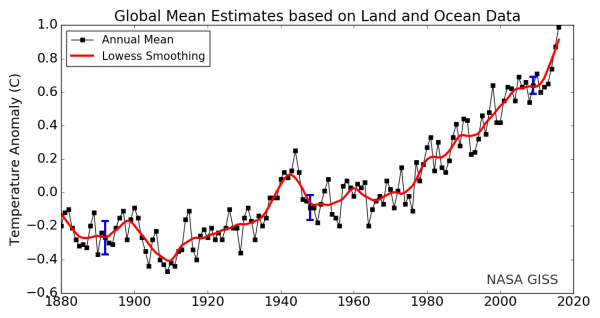NASA Data Shows the Rate of Global Warming is Accelerating — 2016 is Third Consecutive Hottest Year on Record
20
January, 2017
Over
just the past three years, global temperatures have risen by about
0.4 degrees Celsius.This
was an extreme acceleration in the rate of warming. One
that is unmatched in all of the past 136 years of climate record
keeping.
During
2016, according to NASA, global temperatures hit 1.21 C above 1880s
averages. This is a new record high to shatter all previous heat
records. More to the point, the
world’s atmosphere and oceans are now hotter than they’ve been in
at least the past 100,000 years. This
is considerable global warming.
Enough
to tip the world into a new climate age and bring about substantial
geophysical changes.
The
most glaring of these changes is the now impending rise of the
world’s oceans. And as glaciers and ice shelves show signs of rapid
melting in Greenland and Antarctica, we
should consider the fact that the last time ocean surface and
atmospheric temperatures were so warm,
seas were 20 to 30 feet higher than they are today.
Warming
across the world was not distributed evenly during 2016. And the
Northern Hemisphere polar region, according to NASA, received the
heaviest blow from rising atmospheric heat. Above
the 80 degree North Latitude line, temperatures
were fully 4.9 degrees Celsius above average for the period of an
entire year.
As
a result, one of the most vulnerable areas of the world — the
Arctic Ocean — was subjected to extraordinary warming. A warming
that is now removing a considerable chunk of heat-deflecting sea ice
from the Arctic environment and helping to set the stage for further
rapid Arctic warming and worsening glacial melt in Greenland.
All
this heat in the global system means that the world has crossed a
number of critical climate thresholds. This is a bad
situation. Coastal
cities and island nations are now in peril due to sea level rise.
Both stable growing seasons and the stability of regional weather are
also now at risk as worsening
glacial discharge and changes to ocean surface heat distribution
appear to be ongoing and imminent.
These
are hard consequences. But even worse consequences are on the way
unless fossil fuel emissions are rapidly reduced.
Links:
Hat
tip to Colorado Bob





No comments:
Post a Comment
Note: only a member of this blog may post a comment.